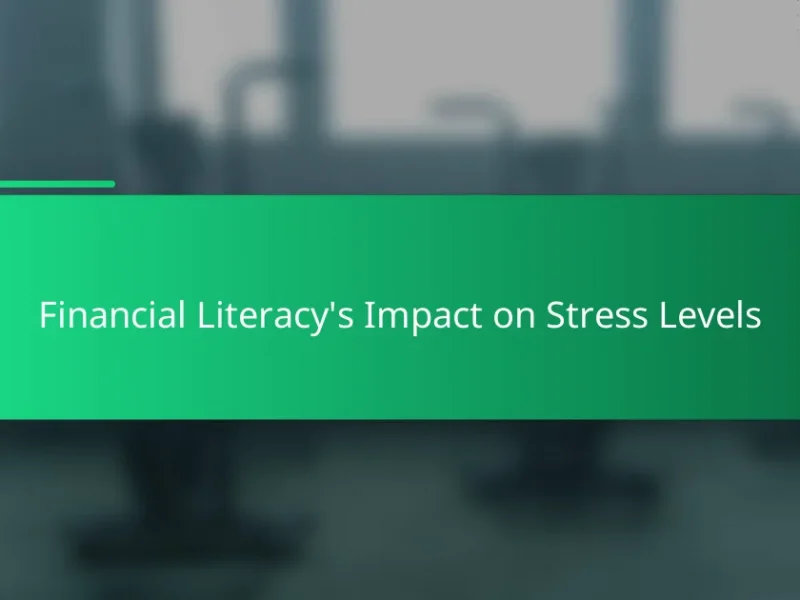Managing money effectively can significantly reduce financial anxiety. Key techniques include creating a budget, tracking expenses, building an emergency fund, and setting financial goals. These strategies foster financial stability and empower individuals to take control of their monetary situation. Implementing them can lead to greater peace of mind and confidence in handling unexpected costs.

What are effective money management techniques for reducing financial anxiety?
Effective money management techniques for reducing financial anxiety include budgeting, tracking expenses, and building an emergency fund. These strategies help create financial stability and peace of mind.
1. Create a budget to allocate funds for essentials, savings, and discretionary spending.
2. Track expenses regularly to identify spending patterns and areas for improvement.
3. Build an emergency fund with three to six months’ worth of living expenses to cover unexpected costs.
4. Set financial goals to provide direction and motivation for saving and spending habits.
By implementing these techniques, individuals can gain control over their finances and reduce anxiety associated with monetary uncertainties.
How does budgeting contribute to financial stability?
Budgeting enhances financial stability by providing a clear plan for income allocation and expense management. It helps individuals identify spending patterns, prioritize needs, and save for emergencies. As a result, budgeting reduces financial anxiety by fostering a sense of control and preparedness for unexpected expenses. Regularly reviewing and adjusting budgets can also improve financial literacy, leading to better long-term financial decisions.
What steps should I follow to create a successful budget?
To create a successful budget, follow these steps: identify income sources, track expenses, categorize spending, set financial goals, allocate funds for each category, and review regularly. This structured approach reduces financial anxiety by promoting clarity and control over your finances.
What tools can assist in tracking my budget?
Budgeting tools can help you track your finances effectively. Popular options include mobile apps, spreadsheets, and online platforms.
1. Mobile Apps: Applications like Mint and YNAB (You Need A Budget) allow real-time tracking and expense categorization.
2. Spreadsheets: Customizable templates in Excel or Google Sheets offer flexibility for personal budgeting.
3. Online Platforms: Websites like Personal Capital provide comprehensive financial tracking and investment management.
These tools enhance financial awareness and reduce anxiety by providing clear insights into spending habits.
How can debt reduction strategies alleviate financial stress?
Debt reduction strategies can significantly alleviate financial stress by creating manageable payment plans. These techniques help individuals regain control over their finances, leading to reduced anxiety and improved mental well-being.
For instance, the snowball method focuses on paying off smaller debts first, providing quick wins that boost motivation. Alternatively, the avalanche method targets high-interest debts, minimizing overall interest paid. Each approach addresses unique financial situations, allowing for tailored solutions.
Implementing a budget can further enhance these strategies. Tracking expenses and prioritizing debt payments fosters a sense of accomplishment and clarity. As a result, individuals can experience a more stable financial environment, reducing stress levels associated with debt.
In summary, effective debt reduction strategies not only address financial obligations but also contribute to emotional relief, promoting a healthier mindset around money management.
What are the most effective methods for paying off debt?
The most effective methods for paying off debt include the debt snowball and debt avalanche strategies. The debt snowball method focuses on paying off the smallest debts first, creating quick wins and boosting motivation. In contrast, the debt avalanche method prioritizes debts with the highest interest rates, reducing overall interest payments. Both techniques require consistent budgeting and tracking of expenses to manage financial anxiety effectively. Setting up automatic payments can also help ensure timely payments and reduce the risk of late fees.
How can I prioritize debts to reduce anxiety?
Prioritize debts by focusing on high-interest accounts first. This method reduces overall interest paid and accelerates debt repayment.
1. List all debts from highest to lowest interest rates.
2. Allocate extra payments to the highest interest debt.
3. Make minimum payments on lower-interest debts.
4. Once the highest debt is paid, move to the next highest.
5. Consider consolidating debts for lower interest rates.
This approach not only alleviates anxiety but also creates a structured plan for financial recovery.
What role does savings play in managing financial anxiety?
Savings significantly reduce financial anxiety by providing a safety net during unexpected expenses. Having savings allows individuals to feel secure and less stressed about their financial situation. Studies show that just having three to six months’ worth of expenses saved can greatly enhance financial stability. This security fosters confidence in managing day-to-day expenses and long-term financial goals. Additionally, savings can empower individuals to make better financial decisions, reducing impulsive spending driven by anxiety.
How much should I save to feel financially secure?
To feel financially secure, aim to save three to six months’ worth of living expenses. This emergency fund provides a buffer against unexpected events. Additionally, consider your unique financial situation, including income stability and personal obligations. Regularly reassess your savings goals to ensure they align with changing circumstances.
What are the best savings strategies for beginners?
Start with a budget, track your expenses, and prioritize saving. Automate your savings to ensure consistency. Use high-yield savings accounts to maximize interest. Lastly, set clear financial goals to motivate your saving efforts.
How can financial education empower better money management?
Financial education enhances money management by providing individuals with the knowledge and skills to make informed financial decisions. This understanding reduces financial anxiety through budgeting, saving, and investing strategies. Equipped with financial literacy, people can create realistic financial goals and track their progress effectively. As a result, they experience increased confidence and control over their financial situations, leading to improved overall well-being.
What resources are available for improving financial literacy?
To improve financial literacy, various resources are available. Online courses, such as those offered by Coursera and Khan Academy, provide structured learning. Books like “The Total Money Makeover” offer practical advice. Local workshops and community programs also enhance understanding. Financial apps, like Mint, help track expenses and budgets. Lastly, podcasts and blogs provide ongoing insights into money management techniques.
What unique techniques can help individuals manage financial anxiety?
Developing a financial plan, practicing mindfulness, and setting realistic goals are unique techniques to manage financial anxiety. These strategies empower individuals to gain control over their finances and reduce stress.
Creating a detailed budget can clarify spending habits and highlight areas for improvement. Mindfulness practices, such as meditation, can help individuals stay present and reduce anxiety related to financial worries. Setting achievable financial goals fosters motivation and provides a sense of accomplishment.
Regularly reviewing financial progress can reinforce positive behaviors and build confidence. Engaging in community support groups can also provide valuable perspectives and shared experiences, enhancing emotional resilience.
How can automated savings impact my financial health?
Automated savings can significantly enhance your financial health by promoting consistent saving behavior. This technique helps reduce financial anxiety by ensuring funds are set aside for future needs without requiring active effort.
Automated savings often lead to increased savings rates. Research indicates that individuals who automate their savings save 20% more on average compared to those who do not. This method minimizes the temptation to spend, reinforcing positive financial habits.
Additionally, automated savings can create a safety net for emergencies, reducing stress related to unexpected expenses. This financial buffer contributes to overall well-being, allowing individuals to focus on long-term goals rather than immediate financial pressures.
In conclusion, implementing automated savings is a proactive step towards improved financial stability and reduced anxiety. By fostering disciplined saving practices, individuals can achieve greater peace of mind and enhanced financial security.
What is the role of financial advisors in anxiety reduction?
Financial advisors play a crucial role in reducing financial anxiety by providing personalized guidance and strategies. They help clients create budgets, set financial goals, and develop investment plans, which fosters a sense of control and security. Regular check-ins with an advisor can alleviate worries about financial decisions and market fluctuations, enhancing overall peace of mind. Additionally, their expertise in navigating complex financial situations can empower clients to make informed choices, further diminishing anxiety related to money management.
What rare money management techniques can be applied?
Rare money management techniques include the envelope system, which allocates cash for specific expenses, and the zero-based budgeting method, where every dollar is assigned a purpose. Another unique approach is the use of financial vision boards, visualizing goals to enhance motivation. Additionally, the 50/30/20 rule offers a simple framework for spending, saving, and investing. These techniques can significantly reduce financial anxiety by providing clarity and control over personal finances.
How can community support networks assist with financial management?
Community support networks can significantly alleviate financial anxiety by providing resources, guidance, and emotional support. These networks often offer workshops on budgeting, debt management, and financial literacy, equipping individuals with essential money management techniques. By fostering connections among members, they create a platform for sharing experiences and strategies, enhancing collective financial well-being. Additionally, these networks may facilitate access to financial counseling services, which can address unique financial challenges and promote informed decision-making.
What unconventional methods have proven effective for reducing financial stress?
Unconventional methods such as mindfulness practices, financial therapy, and community support groups have proven effective for reducing financial stress. Mindfulness helps individuals manage anxiety by promoting awareness of spending habits. Financial therapy combines emotional support with financial planning, addressing underlying issues. Community support groups provide shared experiences and collective problem-solving, fostering a sense of belonging.
What common mistakes should I avoid in money management?
To avoid common mistakes in money management, focus on creating a budget, tracking expenses, and avoiding debt. Neglecting these practices can lead to financial anxiety.
1. Failing to set a realistic budget limits your financial control.
2. Ignoring expenses results in overspending and unexpected deficits.
3. Accumulating debt increases financial stress and reduces future options.
4. Not saving for emergencies can lead to crises during unforeseen events.
Prioritizing these techniques can significantly reduce financial anxiety.
How can I optimize my financial management techniques for long-term success?
To optimize financial management techniques for long-term success, focus on budgeting, tracking expenses, and setting clear financial goals.
Establish a detailed budget that reflects your income and spending habits. Regularly monitor your expenses to identify areas for reduction. Setting specific, measurable financial goals helps maintain motivation and direction.
Consider automating savings and bill payments to ensure consistency. This reduces anxiety associated with missed payments and aids in building an emergency fund. Regularly review and adjust your financial strategies to adapt to changing circumstances.
Utilizing apps or software for tracking can enhance visibility and control over your finances. These tools often provide insights into spending patterns, enabling informed decisions.


